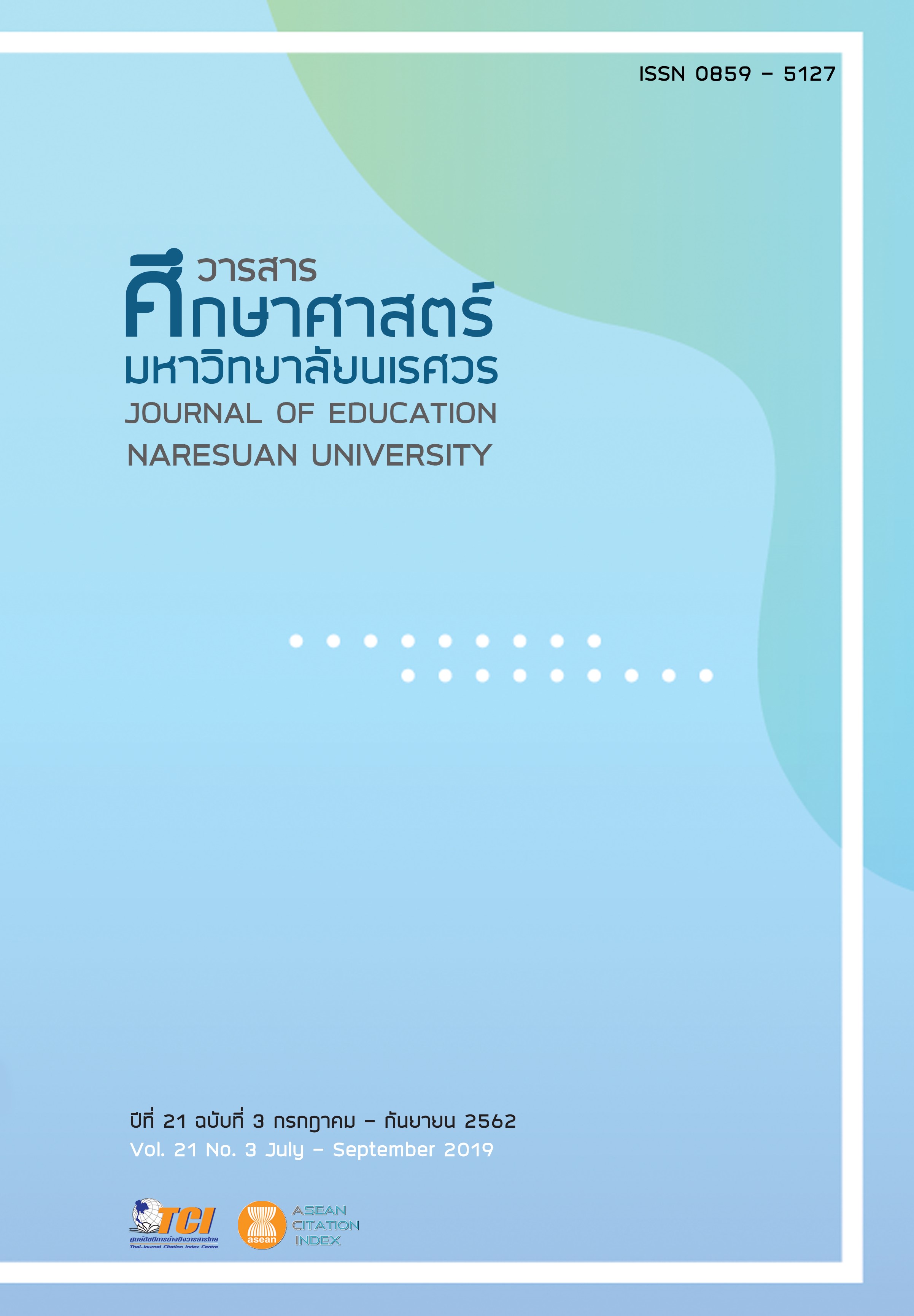การบริหารและการบริการสนับสนุนผู้เรียนพิการในวิทยาลัย สังกัดสำนักงานคณะกรรมการการอาชีวศึกษา (ADMINISTRATION AND SUPPORT SERVICES FOR STUDENTS WITH DISABILITIES IN THE COLLEGES UNDER THE OFFICE OF VOCATIONAL EDUCATION COMMISSION)
Main Article Content
Abstract
การศึกษานี้มีวัตถุประสงค์เพื่อสำรวจความคิดเห็นของผู้บริหารและครูในวิทยาลัยสังกัดสำนักงานคณะกรรมการการอาชีวศึกษาเกี่ยวกับการบริหารและบริการสนับสนุนผู้เรียนพิการ การสำรวจใช้แบบสอบถามกลุ่มตัวอย่างที่เป็นผู้บริหารวิทยาลัย จำนวน 170 คน ครูผู้สอน จำนวน 733 คน และการจัดประชุมกลุ่มย่อยผู้แทนจากวิทยาลัย ซึ่งเป็นแกนนำในการจัดการศึกษาสำหรับคนพิการ จำนวน 20 คน วิเคราะห์ข้อมูลโดยใช้สถิติ ค่าเฉลี่ย และความเบี่ยงเบนมาตรฐาน ผลการศึกษา พบว่า 1) วิทยาลัยส่วนใหญ่เปิดสอนหลักสูตรระยะสั้นสำหรับคนพิการ และในวิทยาลัยบางแห่งเปิดสอนหลักสูตรประกาศนียบัตรวิชาชีพ และวิชาชีพชั้นสูง หลักสูตรที่เปิดสอนระยะสั้น เช่น หลักสูตรการทำขนมไทย อาหารไทย ช่างตัดผม หลักสูตรประกาศนียบัตร เช่น การตลาด การบัญชี คอมพิวเตอร์ธุรกิจ อีเล็กทรอนิกส์ 2) การบริหารหน่วยบริการสนับสนุนนักเรียน นักศึกษาพิการควรขึ้นอยู่กับรองผู้อำนวยการฝ่ายวิชาการ และมีหัวหน้าหน่วยเป็นครูหรือบุคลากรทางการศึกษา มีเจ้าหน้าที่บริหารงานทั่วไป 1 คน เจ้าหน้าที่บริการมีตำแหน่งเป็นนักวิชาการ โดยจำนวนขึ้นอยู่กับภาระงานของแต่ละวิทยาลัย และ 3) บทบาทหน้าที่ของหัวหน้าหน่วยบริการสนับสนุนผู้เรียนพิการ ได้แก่ การจัดวางระบบ การทำแผน การส่งเสริมเพื่อพัฒนาเจ้าหน้าที่ การประเมิน และการทำระบบฐานข้อมูล ส่วนบทบาทหน้าที่ของเจ้าหน้าที่บริการ ได้แก่ การจัดหาสื่อ อุปกรณ์สิ่งอำนวยความสะดวก การประสานงานกับหน่วยอื่นเพื่อปรับสภาพแวดล้อม และการหางานทำระหว่างเรียนหรือปิดภาคเรียน
ADMINISTRATION AND SUPPORT SERVICES FOR STUDENTS WITH DISABILITIES IN THE COLLEGES UNDER THE OFFICE OF VOCATIONAL EDUCATION COMMISSION
This study examined administrators and teachers’ opinions in the colleges under the Office of the Vocational Education Commission on the administration and support services for students with disabilities. The survey was conducted by a constructed questionnaire with the selected samples of 170 administrators and 733 teachers in the vocational colleges. The data collecting also included a focus group of 20 representatives from the pilot colleges where provide education for students with disabilities. Statistics used for data analysis were mean and standard deviation. The results of the study revealed 1) most of vocational colleges provide short courses for students with disabilities. Some colleges offered vocational certificate programs and high vocational certificate programs. The most provided short courses were Thai dessert, Thai food, and Barber. The certificate programs were Marketing, Accounting, Computer, and Electronics. 2) The Deputy College Directors in academic are responsible for administrating support services for students with disabilities. The Head of Support Services Unit should be a teacher or an educational officer with one general administrative officer. The service providers should be an academic officer. The number of the academic officer depends on their workload of each institute. 3) The roles and functions of Head of Support Services Unit include managing system, planning, supporting for officer development, evaluating, and developing data based systems. The roles and functions of academic officers are to provide media access, assistive devices and technology, to cooperate in accommodation with other units in institute, and to help finding part-time jobs during the semester and the semester break.
Article Details
The owner of the article does not copy or violate any of its copyright. If any copyright infringement occurs or prosecution, in any case, the Editorial Board is not involved in all the rights to the owner of the article to be performed.
References
2. Duffy, J. T., & Gugerty, J. (2005). The role of disability support services. In Getzel, E. E., & Wehman, P. (Eds.), Going to college (pp. 89-115). Sydney: Paul H Brookes.
3. Educational Provision for Persons with Disabilities Act, B.E. 2551. (2008, February 5). Government Gazette. 125 (28a), 1-13. [in Thai]
4. Harbour, W. S. (2009). The relationship between institutional unit and Administrative Features of disability services offices in higher education. Journal of Postsecondary Education and Disability, 21(3), 138-154.
5. Manager Online. (2014, September 25). Quality of life. Retrieved from https://www.manager.co.th/QOL/ViewNews.aspx?NewsID=9570000111482 [in Thai]
6. Mongkolsawadi, S., Tongsata. P., Sansaporn, S., & Yaikaensai, P. (2009). Final report in employment support system for people with disabilities in open labour Market. Pattaya: The Redemptorist. [in Thai]
7. Shaw, S. F. (2002). Postsecondary supports for students with disabilities. Retrieved from https://www.ncset.hawaii.edu/institutes/mar2002/papers/pdf/POSTSECONDARY%20SUPPORTS%20.PDF
8. Stodden, A. R. & Conway, A. M. (2003). Supporting individuals with disabilities in postsecondary education. American Rehabilitation, 27, 24-33.
9. Tagayuma, A., Stodden, A. R., Chang, C., Zeleznik, E. M. & Whelley, A. T. (2005). A two-year comparison of support provision for persons with disabilities in postsecondary education. Journal of Vocational Rehabilitation, 22, 13-21.
10. The Office of Vocational Education Commission. (2014). The Office of Vocational Education Commission annual report 2014. Bangkok: Minburi Technical College. [in Thai]
11. Wongkhiao, S., & Kornpuang, A. (2017). The administration model for enhancing mainstreaming standard of inclusive schools under the office of the basic education commission. Journal of Education Naresuan University, 19(2), 230-244. [in Thai]


